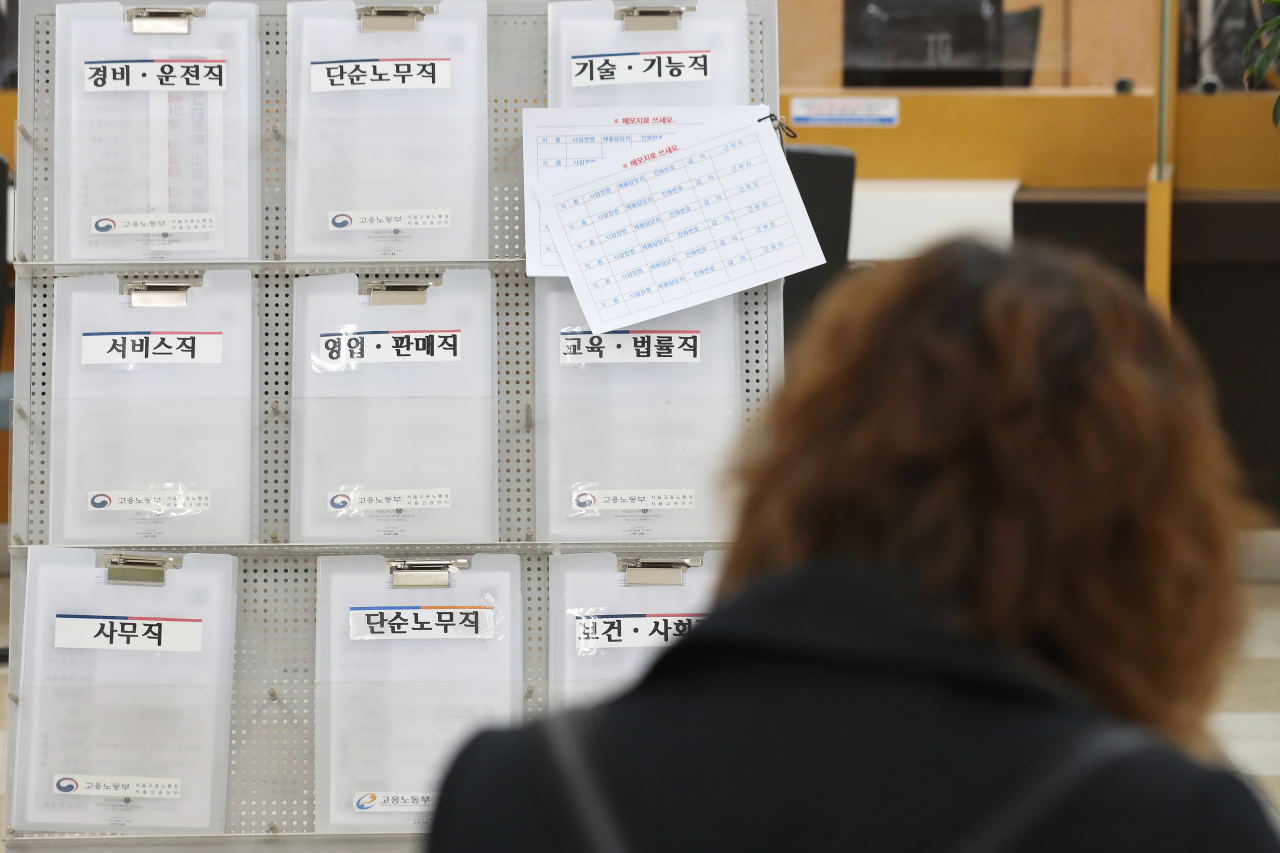Jobs disappear at sharpest pace since 1999
Finance minister vows to swiftly create 550,000 plus jobs
By Jung Min-kyungPublished : May 13, 2020 - 16:46

Recalling the nightmares of the 1997-98 Asian financial crisis, the number of employed in South Korea last month fell dramatically and at its fastest pace in two decades, data showed Wednesday.
The number of employed here stood at 26.6 million in April, shedding 476,000 on-year, data released by Statistics Korea showed. This was shy of the corresponding figure for February 1999, when 658,000 jobs vanished and the nation’s economy was reeling from the financial crisis.
The unemployment rate slipped 0.2 percent to 4.2 percent in the cited period.
The labor force participation rate of those aged 15 or older came to 59.4 percent in April, which marked the lowest since 59.2 percent in April 2010. The rate is a yardstick for the economy’s active workforce and is calculated by dividing the number of employed or job seekers by the total noninstitutionalized, civilian working-age population.
Addressing the data, Finance Minister Hong Nam-ki vowed to swiftly create 550,000 or more jobs and map out measures in a series of economic meetings held throughout this month.
“To prevent the spread of employment shock in key industries including manufacturing, the government will make preemptive moves through the (state-backed special fund worth 40 trillion won ($32.6 billion)) with additional measures to quell the labor market,” Hong said during a meeting of economy-related ministries.
According to Hong, the government will make best efforts to swiftly draw and submit its third extra budget projected to be worth around 30 trillion won to the National Assembly. A key purpose of the third supplementary budget will be to bring about stabilization in the labor market and create jobs, he added.
Earlier this year, on two separate occasions, the National Assembly approved the government’s allocation of two extra budgets worth a combined 23.9 trillion won to combat economic risks from the COVID-19 spread.
The news comes as Korea’s economic contraction has been gaining momentum in recent months, weighed down by lackluster consumer spending and exports due to COVID-19, according to state-run think tank Korea Development Institute on Tuesday.
The nation’s overall industrial output declined 0.3 percent on-month in March, while service sector output declined nearly 5 percent in the same period, marking the sharpest drop since the KDI started compiling the data in 2000.
Exports also sank 24.3 percent on-year to $36.9 billion in April and the export-reliant economy suffered a trade deficit of $950 million in the same period, ending a 98-month streak of exports outrunning imports.
President Moon Jae-in noted at the third anniversary of his inauguration held Sunday that the economy now faces a “wartime situation” with the employment shock growing with time under the current pandemic.
By Jung Min-kyung (mkjung@heraldcorp.com)







![[Graphic News] More Koreans say they plan long-distance trips this year](http://res.heraldm.com/phpwas/restmb_idxmake.php?idx=644&simg=/content/image/2024/04/17/20240417050828_0.gif&u=)
![[KH Explains] Hyundai's full hybrid edge to pay off amid slow transition to pure EVs](http://res.heraldm.com/phpwas/restmb_idxmake.php?idx=644&simg=/content/image/2024/04/18/20240418050645_0.jpg&u=20240419100350)






![[From the Scene] Monks, Buddhists hail return of remains of Buddhas](http://res.heraldm.com/phpwas/restmb_idxmake.php?idx=652&simg=/content/image/2024/04/19/20240419050617_0.jpg&u=20240419175937)

![[KH Explains] Hyundai's full hybrid edge to pay off amid slow transition to pure EVs](http://res.heraldm.com/phpwas/restmb_idxmake.php?idx=652&simg=/content/image/2024/04/18/20240418050645_0.jpg&u=20240419100350)

![[Today’s K-pop] Illit drops debut single remix](http://res.heraldm.com/phpwas/restmb_idxmake.php?idx=642&simg=/content/image/2024/04/19/20240419050612_0.jpg&u=)